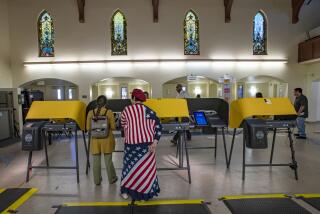Abstinence, AIDS and Dan Quayle
- Share via
So, here we go again. Another presidential campaign.
I used to cover these things for a living. But several years ago, I quit chasing candidates across the country and settled down to a more sensible reporting job. My traveling political reporter’s mad enthusiasm, which had compelled me to record every inanity uttered by a candidate, faded into the maturity of a middle-aged Los Angeles homeowner. Before I knew it, I was looking at presidential candidates as if I were just another voter.
Now, when I occasionally cross the trail of a presidential candidate, I want to know how he’s going to help me, or L.A.
What’s he going to do about the GM plant closing in Van Nuys? What about Lockheed moving to Georgia? Why can’t he improve the public schools? Or stop the gang killings? Why is the air so bad? Why can’t he beat AIDS?
Notebook and tape recorder in hand, I’ve heard the questions candidates are asked at breakfasts with worried business people in Sherman Oaks and Montebello; at lunchtime forums for TRW aerospace workers in Torrance; in meetings with seniors in Watts.
I usually find the candidate’s answers unsatisfying, to me as a reporter and to the audience. The candidates would rather fall back on campaign themes that you know have been well-cooked and pre-tested by consultants and pollsters.
I’m not alone. The dismal process prompted political correspondent E.J. Dionne Jr. to write in his new book, “Why Americans Hate Politics”: “The 1988 campaign left Americans with ashes in their mouth . . . Most of the issues Americans really cared about had gone largely undiscussed.”
One of the first arrivals of the new season was Vice President Dan Quayle, who intends to spend considerable time in California in 1992 campaigning for the Bush-Quayle ticket.
Last Friday, the vice president met with a group of political writers who occasionally question politicians over breakfast at the Sheraton West, near downtown.
Quayle had been there a year ago and it was interesting to see the changes time had brought. There are small bags under his eyes. The slightest hint of lines are appearing elsewhere on his face.
Others might mourn these age-induced changes and, in Southern California, even take steps to hide them. But for the slight, slender Quayle, they’re a plus. He no longer looks like a Midwestern fraternity boy.
Quayle has also shed much of his early defensiveness. He laughs off the tough questions with a Reagan-like, self-deprecating humor. And he speaks with an aura of knowledgeability that marks the well-prepared candidate.
AIDS was the main topic on this morning after Magic Johnson’s announcement that he had the virus that causes the disease.
What about spending more money on a cure? The Administration, Quayle said, is putting more money into AIDS than cancer or heart disease. There are, he said, “a lot of other diseases. We are tending to them all.”
The conversation turned to Johnson’s plea for education on safe sex. Quayle said there’s “a lot of virtue in abstinence . . . risk is greatly lowered if you engage in abstinence rather than safe sex.”
There was something irrelevant, even unreal, about these answers.
The safe sex battle has already been fought here.
The Los Angeles county supervisors argued the morality of the issue for four painful years. Finally, last March, they voted 3 to 2 to distribute bleach and condoms to intravenous drug users.
One reason for the vote was the election of liberal Gloria Molina to replace conservative Pete Schabarum. But it wouldn’t have been possible without Supervisor Kenny Hahn, a fundamentalist Christian who had long opposed government support of needle and condom distribution.
The toll of dead and ailing persuaded Hahn to reverse his position. He knew there have been more than 13,000 AIDS cases in L.A. County since 1981. By last month, 9,205 had died. More than 37,000 are infected with the virus that causes the disease--one in 233 people.
As for money to treat and research AIDS, even conservatives would like more from Washington. The board grabbed new federal funds for facilities to reduce the 21-week waiting period for AIDS patients at County-USC Medical Center. The wait is now five weeks, and every supervisor wants it to be shorter.
Making Quayle’s response even more frustrating was the site of our breakfast--the Sheraton West. I doubt if Quayle knows it, but the hotel is just a few blocks from MacArthur Park, one of the worst intravenous drug supermarkets in the city. Go preach abstinence there.
The campaign has started. And the frustration begins.
More to Read
Get the L.A. Times Politics newsletter
Deeply reported insights into legislation, politics and policy from Sacramento, Washington and beyond. In your inbox twice per week.
You may occasionally receive promotional content from the Los Angeles Times.










